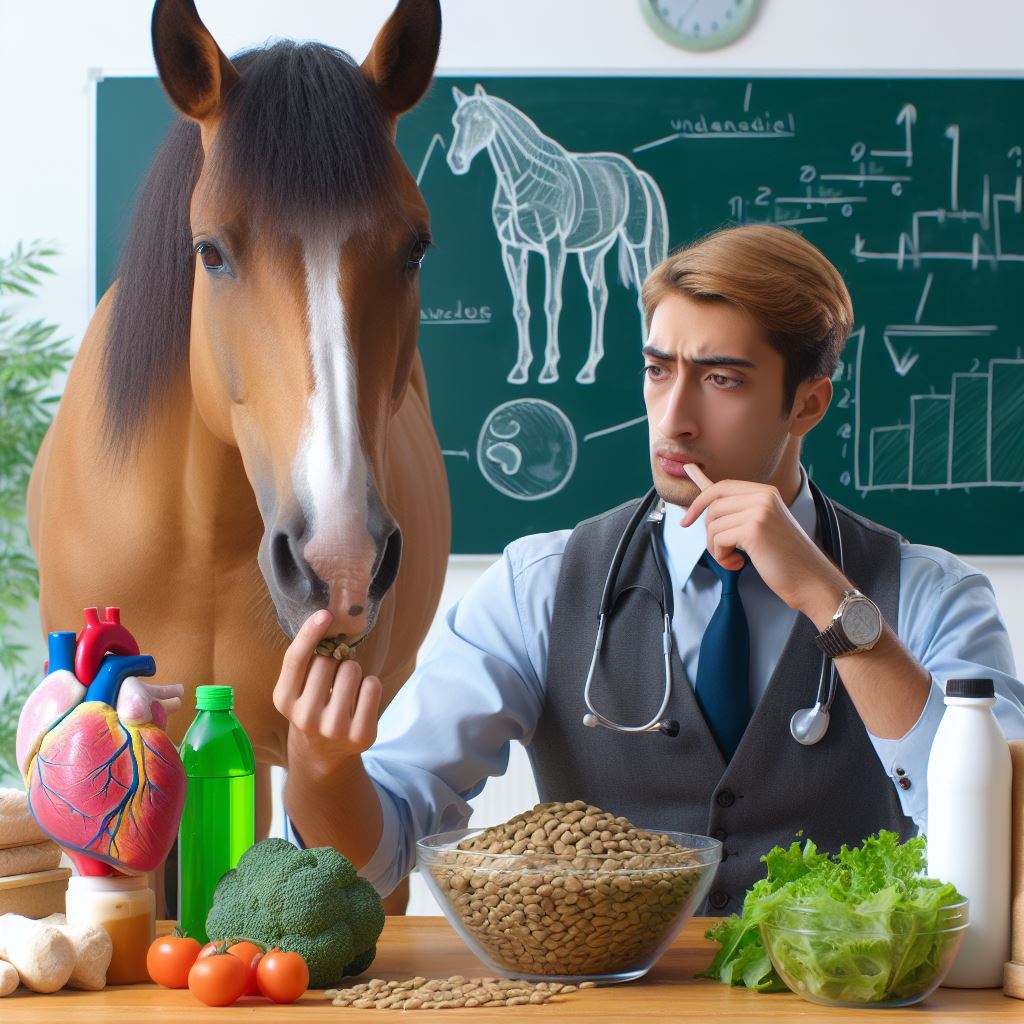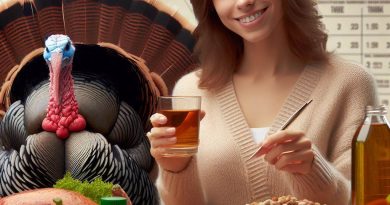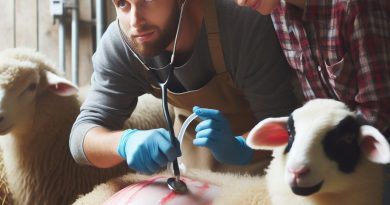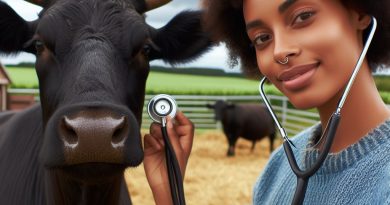Horse Feeding Strategies for Optimal Health
Last Updated on January 24, 2024
Introduction
Brief overview of the importance of proper horse feeding strategies for optimal health
Proper horse feeding is essential for maintaining the overall health and well-being of these majestic animals.
The nutritional needs of horses depend on various factors such as their age, breed, activity level, and overall health condition.
Neglecting these factors can lead to nutritional imbalances, which could potentially result in health issues.
Different factors influencing horse feeding
To ensure optimal health, horse owners must understand the importance of providing a balanced diet.
Factors like age play a significant role in determining the feeding strategies.
Younger horses often require more frequent meals with higher protein levels to support their growth and development.
On the other hand, older horses may need modified diets that are easier to chew and digest.
Thesis statement: This blog post will discuss various horse feeding strategies to ensure optimal health.
Breed-specific dietary considerations are also crucial. Different breeds have varying metabolic rates and dietary requirements.
For example, some breeds are prone to metabolic disorders such as insulin resistance, requiring carefully managed diets with restricted access to certain nutrients.
The activity level of a horse is another important factor influencing feeding strategies.
Horses engaged in intense physical activities like racing or competitive sports need diets high in energy and protein to support their performance.
Conversely, horses with lower activity levels may require diets with controlled energy intake to prevent weight gain and related health problems.
Therefore, understanding the importance of proper nutrition and tailoring feeding strategies to individual horses is crucial for their optimal health.
This blog post will further explore specific horse feeding strategies that can support their overall well-being.
Stay tuned for informative insights and practical tips in our upcoming sections.
Understanding Horse Nutrition
Explanation of the basic nutritional needs of horses
Proteins, carbohydrates, and fats
These macronutrients are crucial for a horse’s overall health and performance. Proteins are essential for tissue repair and muscle development.
Carbohydrates provide energy, while fats offer a concentrated energy source and aid in vitamin absorption.
Importance of vitamins and minerals for horse health
- Vitamins: These organic compounds are necessary for the proper functioning of a horse’s body. They assist in metabolism, immune system support, and overall growth and development. Vitamins, such as vitamin A, B, C, D, and E, should be present in a horse’s diet to prevent deficiencies and maintain optimal health.
- Minerals: Essential minerals, like calcium, phosphorus, magnesium, and potassium, play a vital role in a horse’s physiological processes. They help in bone development, muscle contraction, nerve conduction, and fluid balance. Adequate amounts and proper ratios of minerals are necessary for a horse’s well-being.
Role of water in maintaining a horse’s well-being
- Hydration: Water is the most critical nutrient for horses. It is essential for digestion, nutrient absorption, temperature regulation, waste elimination, and overall cell function. Horses should have access to clean and fresh water at all times to prevent dehydration and promote optimal health.
- Daily intake: Horses typically consume around 5 to 10 gallons of water per day, depending on their size and activity level. During hot weather, intense exercise, or when pregnant or lactating, horses may require even more water. Adequate water intake is vital for efficient digestion and overall health.
- Water quality: It is crucial to ensure the quality of water provided to horses. Contaminated or stagnant water sources can lead to health issues or decrease water intake. Regularly checking water sources and providing clean water can prevent digestive problems and promote horse well-being.
Most importantly, understanding horse nutrition is essential for maintaining their optimal health.
Providing a balanced diet that includes proteins, carbohydrates, fats, vitamins, minerals, and ample water is crucial.
Proteins, carbohydrates, and fats provide energy, muscle development, and overall tissue repair.
Vitamins and minerals support various physiological processes, growth, and immune system function.
Additionally, water plays a critical role in hydration, digestion, waste elimination, and temperature regulation.
By addressing these nutritional needs, horse owners can ensure their horses’ well-being and longevity.
Read: Rabbit Feed Types: Balancing Nutrition & Growth
Assessing a Horse’s Nutritional Needs
Body condition scoring as a tool for determining feeding requirements
Assessing a horse’s nutritional needs is crucial for maintaining optimal health and performance.
Body condition scoring serves as a valuable tool in evaluating a horse’s overall well-being.
By assessing factors such as fat deposition and muscle tone, this scoring system helps determine whether a horse is underweight, ideal, or overweight.
Based on the body condition score, adjustments can be made to the horse’s feeding requirements.
For horses with a low body condition score, more calories may be necessary to facilitate weight gain.
Identifying horse’s breed, age, and activity level
In addition to body condition scoring, identifying a horse’s breed, age, and activity level is essential in determining its nutritional needs.
Different breeds have varying metabolism rates, so their feeding requirements differ as well.
Young horses have higher energy requirements due to growth and development, while active horses engaged in intense training or competition need more energy and nutrients.
On the other hand, adult leisure horses may have lower energy needs and can be fed accordingly.
Consideration of health issues and dietary sensitivities
Furthermore, consideration of health issues and dietary sensitivities plays a significant role in establishing a horse’s optimal feeding plan.
Horses with metabolic disorders or gastrointestinal problems may require specific diets to manage their conditions.
For instance, horses with insulin resistance or equine metabolic syndrome benefit from a low-starch, low-sugar diet.
Additionally, some horses may have dietary sensitivities or allergies, necessitating exclusions of certain ingredients from their diet.
To address such concerns, it is important to consult a veterinarian who can provide guidance in creating a customized feeding plan based on the horse’s specific health needs.
In essence, assessing a horse’s nutritional needs encompasses various factors.
Body condition scoring helps evaluate the horse’s overall health, while considering breed, age, and activity level ensures appropriate energy and nutrient intake.
Additionally, health issues and dietary sensitivities must be taken into account when formulating a feeding plan.
By understanding and addressing these considerations, horse owners can optimize their equine companions’ health and well-being.
Read: Dairy Cow Diet Essentials for Maximum Milk Yield
Choosing the Right Feed for Optimal Health
Types of horse feed available in the market
- Grass and hay
- Pellets and concentrates
Determining the appropriate feed based on nutritional content and specific requirements of the horse
Feeding horses is not a one-size-fits-all approach.
To ensure optimal health, it is crucial to choose the right feed based on various factors such as nutritional content and the specific requirements of the horse.
When it comes to horse feed available in the market, there are different options to consider.
The two main categories are grass and hay, as well as pellets and concentrates.
Grass and hay, which are natural forage sources, provide essential nutrients to horses.
They are high in fiber, which promotes a healthy digestive system and helps prevent health issues like colic.
Feeding horses grass and hay also enables them to practice natural grazing behaviors.
On the other hand, pellets and concentrates offer concentrated sources of nutrition.
They are formulated to meet specific dietary needs and are often used to supplement or balance the forage-based diet.
These feed options can be beneficial for horses with higher energy requirements, such as performance horses or those recovering from illness or injury.
The choice between grass/hay and pellets/concentrates depends on the horse’s nutritional needs and specific circumstances.
It is important to consult with a veterinarian or equine nutritionist to determine the best option for individual horses.
Regular evaluation and adjustment of the horse’s feed based on changing needs
As horses age or experience changes in their activity level, their nutritional needs may change.
It is crucial to regularly evaluate and adjust their feed accordingly.
Regular evaluation involves monitoring the horse’s body condition score, which assesses the level of fat cover and overall health.
This score helps determine whether the horse is receiving an appropriate amount of feed and whether adjustments are necessary.
In addition to body condition, observing the horse’s performance, behavior, and overall well-being can provide valuable information about their nutritional status.
If a horse shows signs of weight loss, decreased energy, or poor coat condition, it may indicate a need for adjustments in their feeding program.
Adjustments can include modifying the amount of feed, introducing additional supplements, or changing the type of feed altogether.
Again, it is crucial to consult with a professional to ensure that the changes made are appropriate and properly address the horse’s changing needs.
In fact, selecting the right feed for horses is essential for their optimal health.
Understanding the available types of horse feed and considering nutritional content and specific requirements are crucial in making informed decisions.
Regular evaluation and adjustment of the horse’s feed based on changing needs ensures that they receive the necessary nutrients for overall well-being.
Read: Layer Hen Feed: Boosting Egg Production Naturally

Feeding Routine and Schedule
Establishing a consistent feeding routine plays a crucial role in ensuring optimal digestion for horses.
With the right frequency, portion control, and timing, you can promote your horse’s health and well-being.
Importance of Consistent Feeding Routine for Horse’s Digestion
A regular feeding routine is vital for a horse’s digestive system to function efficiently.
Horses are grazing animals and have evolved to constantly eat for optimal digestion.
Consistency in feeding helps maintain a healthy gut and prevents digestive disorders.
When a horse is fed at regular intervals, the digestive system adapts and secretes digestive enzymes accordingly, optimizing the breakdown of food.
Irregular feeding can disrupt this process and lead to issues such as colic or gastric ulcers.
Frequency of Feeding and Portion Control
The frequency of feeding depends on several factors, including the horse’s size, activity level, and overall health.
Horses require a continuous intake of food, and thus, they should not be subjected to long periods of fasting.
Generally, horses should be fed at least two to three times a day, with access to forage in between meals.
This prevents extended periods without food, which can lead to digestive issues such as gastric acid buildup.
It is also important to adjust the portion sizes based on the horse’s individual needs to maintain a healthy weight.
Recommended Timing of Feeding, Taking into Account Horse’s Activity Level and Possible Restrictions
The timing of feeding should be determined based on the horse’s activity level and any restrictions they may have.
It is crucial to plan meals with consideration for exercise routines and potential limitations.
For horses engaged in light to moderate exercise, it is advisable to feed them one to two hours before riding or working.
This ensures that the horse has enough energy without experiencing discomfort during physical activity.
After a workout, the horse should be allowed a sufficient cool-down period before feeding.
However, for horses on restricted exercise due to injury, less feed may be required, as their energy demands are lower.
Adjusting the feeding schedule and portion sizes accordingly can help maintain their weight and prevent excessive energy intake.
Special considerations should also be made for horses with certain health conditions, such as metabolic disorders or insulin resistance.
These horses may require specific feeding schedules and restrictions to manage their conditions effectively.
Establishing a consistent feeding routine, focusing on frequency, portion control, and timing, is essential for promoting optimal health and digestion in horses.
By providing regular meals and considering the horse’s activity level and potential restrictions, you can support their overall well-being and prevent digestive issues.
Remember to consult with a veterinarian or equine nutritionist to develop a feeding routine tailored to your horse’s individual needs.
Read: Sheep Feeding 101: Nutrition for Flock Health
Ensuring Proper Forage Intake
Adequate forage intake is essential for maintaining optimal health in horses.
Grazing opportunities, consistent access to fresh forage, and supplementation with hay during limited grazing periods are all important factors to consider.
Grazing opportunities for horses and their impact on overall health
It is a natural behavior for horses and provides numerous benefits to their overall health.
It allows for exercise, mental stimulation, and encourages a more natural feeding pattern.
When horses are allowed to graze, they are more likely to consume a diverse range of plant species, providing them with a balanced diet.
This can help prevent nutritional deficiencies and promote healthy digestion.
In addition, grazing helps in the prevention of obesity and other metabolic disorders.
Horses that graze have a more regulated intake of food, limiting the risk of overeating or consuming concentrated feeds with a high sugar content.
To ensure optimal health, horses should have access to grazing opportunities for a significant portion of the day.
This can be achieved by providing large, well-maintained pastures with safe fencing.
Ways to provide consistent access to fresh forage
Consistent access to fresh forage is crucial for maintaining the health and well-being of horses.
This can be achieved through several strategies:
- Rotational grazing: Dividing pasture into smaller sections and periodically rotating horses helps prevent overgrazing and ensures access to fresh forage.
- Strip grazing: Using electric fencing to limit the area available for grazing allows for controlled access to fresh forage.
- Paddock Paradise: Creating a track system with restricted grazing areas encourages movement and mimics natural foraging behavior.
- Hay racks or slow feeders: These can help provide a constant supply of fresh forage, especially when grazing is limited.
- Monitoring pasture quality: Regularly assessing the nutritional value of the forage can help ensure horses have access to high-quality feed.
Supplementing forage with hay during limited grazing periods
During certain times of the year or when pasture availability is limited, horses may require additional forage supplementation.
Hay plays a crucial role in meeting their nutritional needs.
When selecting hay, it is important to consider its quality. Horses should have access to clean, dust-free hay that is free from molds and weeds.
The nutritional content can be evaluated through laboratory analysis.
Hay should be fed in a way that mimics natural grazing patterns.
It is recommended to use slow feeders or hay nets to slow down consumption and promote a more natural feeding behavior.
It is crucial to monitor the body condition of horses during periods of limited grazing and adjust hay supplementation accordingly.
Overfeeding hay can lead to weight gain, while underfeeding can result in nutritional deficiencies.
Regular veterinary check-ups and consultation with equine nutritionists can help ensure proper supplementation and overall health of horses during limited grazing periods.
In short, providing grazing opportunities, consistent access to fresh forage, and supplementing with hay during limited grazing periods are vital for maintaining optimal health in horses.
By implementing these strategies, horse owners can enhance the well-being and overall performance of their equine companions.
Hydration and Water Management
In this section, we will discuss the importance of hydration and water management for horses, emphasizing how water contributes to digestion and overall health.
We will also explore strategies for ensuring access to clean and fresh water at all times, as well as monitoring and managing water intake in extreme weather conditions or during strenuous activities.
Emphasize the importance of water for digestion and overall health
Water plays a crucial role in a horse’s digestion and overall health. It aids in the breakdown and absorption of nutrients from their feed, enabling optimal digestion.
Dehydration can lead to colic, reduced appetite, and other health issues, so providing an adequate water supply is essential.
Additionally, water helps regulate body temperature and supports various physiological functions.
Horses lose a significant amount of water through sweating, which can increase during hot weather or intense exercise.
Adequate hydration is necessary to prevent heat stress and maintain proper bodily functions.
Ensuring access to clean and fresh water at all times
It is crucial to ensure that horses have access to clean and fresh water at all times.
Water should be free from contaminants, such as dirt, feces, and algae.
Regularly cleaning water troughs or buckets and monitoring water quality is necessary to prevent bacterial growth and maintain hygienic conditions.
When providing water, consider the location and accessibility for all horses in the herd.
Multiple water sources are recommended to minimize competition, especially in larger groups.
Automatic waterers or large troughs can be useful to accommodate the water needs of multiple horses effectively.
Monitoring and managing water intake, especially during extreme weather conditions or strenuous activities
Monitoring and managing water intake is particularly important during extreme weather conditions or strenuous activities.
Horses may require more water in hot and humid climates to stay hydrated.
Encouraging frequent drinking by offering water breaks during exercise sessions is vital.
During cold weather, horses tend to consume less water, increasing the risk of dehydration.
It is necessary to monitor their water intake during winter months and ensure water is not frozen or too cold for them to drink.
Using heated water sources or adding warm water to feed can promote adequate hydration.
In certain situations, such as endurance rides or long-distance transportation, horses may have limited access to water.
To prevent dehydration, electrolyte supplementation or wetting feed with water can help maintain hydration levels during these periods.
In review, ensuring proper hydration and water management is crucial for a horse’s digestion and overall health.
Providing clean and fresh water at all times, monitoring intake, and adjusting for extreme weather or strenuous activities are essential strategies.
By prioritizing hydration, horse owners can promote optimal well-being and prevent health issues related to dehydration.
Monitoring and Adjusting Feeding Strategies
Properly monitoring and adjusting a horse’s feeding strategies is essential to ensuring optimal health and performance.
By regularly assessing the horse’s body condition and overall health, horse owners can make informed decisions about their feeding program.
Regular assessment of horse’s body condition and overall health
One important aspect of monitoring a horse’s feeding strategy is regularly evaluating their body condition.
This involves visually assessing their weight, muscle tone, and overall body condition score.
By regularly observing the horse’s body condition, any significant changes can be detected early on and addressed accordingly.
In addition to monitoring body condition, it is crucial to evaluate the horse’s overall health.
This includes observing their coat quality, hoof condition, energy levels, and behavior.
Changes in any of these areas may indicate an imbalance or deficiency in the horse’s diet.
While regular observation is vital, it is equally important to consult with a veterinarian or equine nutritionist.
These professionals can provide expert advice and guidance specific to each horse’s individual needs.
They can analyze the horse’s overall health and body condition and provide personalized recommendations for adjusting the feeding program.
Importance of consulting with a veterinarian or equine nutritionist
By consulting with a veterinarian or equine nutritionist, horse owners gain access to specialized knowledge on equine nutrition.
These professionals have a deep understanding of the nutritional requirements of horses and can help develop a feeding program tailored to specific goals, such as weight gain, muscle development, or addressing health issues.
Based on the assessment of the horse’s body condition, overall health, and the guidance of experts, necessary adjustments to the feeding program can be made.
This may involve modifying the type or quantity of feed, adjusting the feeding schedule, or introducing supplements to address any deficiencies.
Making necessary adjustments to the feeding program based on horse’s changing needs and goals
It is important to recognize that a horse’s nutritional needs change over time. Factors such as age, activity level, pregnancy, and training intensity all influence their requirements.
Regular reevaluation of the horse’s feeding program ensures that adjustments are made to meet their changing needs and goals.
For example, a horse in intensive training may require more calories to support their increased energy expenditure.
On the other hand, an older horse may need a modified diet to support joint health or to prevent weight gain.
Making necessary adjustments to the feeding program based on the horse’s changing needs ensures their nutritional requirements are met and optimal health is maintained.
Over all, monitoring and adjusting a horse’s feeding strategies is a critical aspect of ensuring their optimal health.
By regularly assessing their body condition and overall health, consulting with professionals, and making necessary adjustments, horse owners can provide a nutritionally balanced diet that supports the horse’s well-being and performance.
Conclusion
Implementing the right feeding regimen is vital for maintaining a horse’s optimal health, longevity, and performance.
Throughout this blog post, we have highlighted important aspects such as providing a balanced diet, understanding their nutritional requirements, and considering the horse’s age, weight, and activity level.
By implementing proper feeding strategies, horse owners can contribute to the prevention of various health issues and promote their horse’s overall well-being.
A well-balanced diet promotes strong bones, a healthy digestive system, and a shiny coat.
Moreover, it is crucial to consider the individual horse’s needs and adjust their feeding program accordingly.
Regular monitoring of a horse’s weight, body condition, and overall health allows for necessary adjustments to be made.
It is important to consult with a veterinarian or equine nutritionist to ensure the best feeding program is tailored to each horse.
The importance of implementing proper horse feeding strategies cannot be overstated.
It ensures horses receive the necessary nutrients, aids in preventing health concerns, and supports their overall performance and well-being.
We encourage horse owners to broaden their knowledge on equine nutrition, continuously educate themselves, and stay updated with advancements in the field.
Ongoing education and regular monitoring of a horse’s feeding program will contribute to their overall health and happiness. Remember, a healthy horse is a happy horse!


